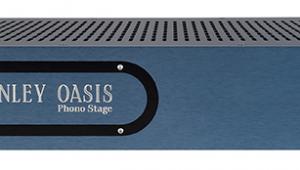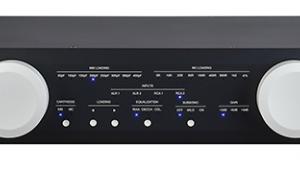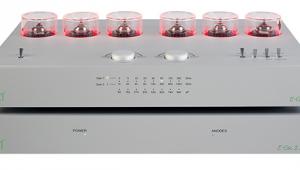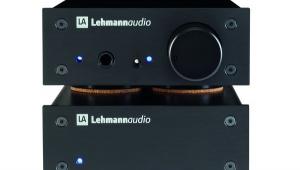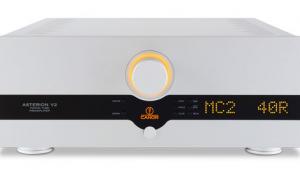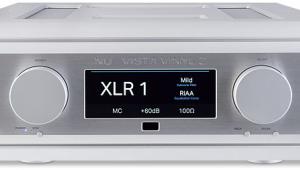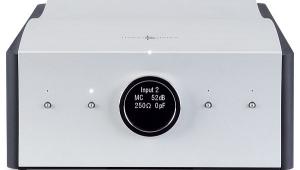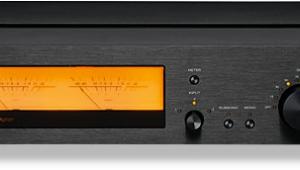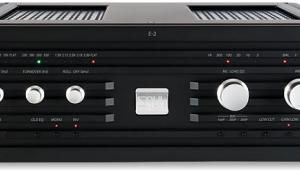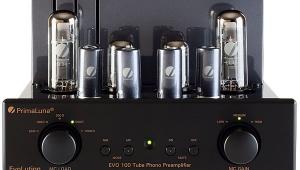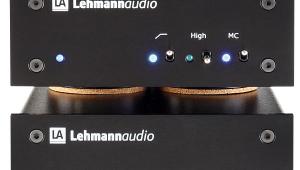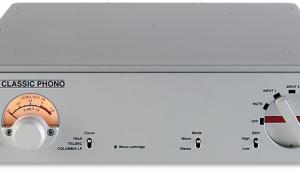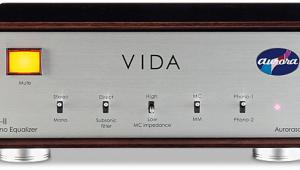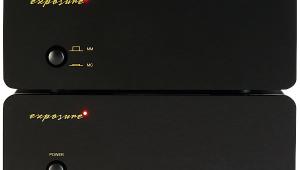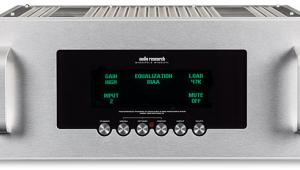Rcm Sensor Prelude (£1695)
While there’s little that’s grand looking about RCM Audio’s Sensor Prelude phono amplifier, despite it costing considerably in excess of a grand, close inspection reveals that it has been purposefully designed.
A substantial brushed alloy fascia disguises what is otherwise a rather utilitarian metal case. But there’s little to complain about its construction quality, other than the cheapness of the stuck-on rubber feet. A separate power supply box connects via an umbilical cable of fixed length and locking DIN connector while the cable is generous in length to allow remote placement. A phono stage’s duty is to amplify minute low-level signals so it’s always good practice to keep power lines and supplies at arm’s length.
If you’re a UK reader you’ll be asking, ‘Who is RCM Audio?’ It’s a Polish company with a portfolio of just two products currently in its line up, an integrated valve amplifier and this MM/MC phono stage. Select Audio of Cumbria is importing RCM gear, Select already distributing such prestigious marques as Luxman, Basis, Airtight, and the legendary Swiss-made Benz-Micro cartridge range too.
ARTISAN EQUALISATION
The Sensor’s series of dip switches provides load adjustment to match your chosen MM or MC cartridge, along with seven selectable gain settings from 0.3 to 5mV. Unusually it offers balanced operation too [see box out, left]. While designed around ICs the RIAA equalisation is achieved using ‘hand matched’ discrete components. In true artisan fashion RCM claims precise matching to ensure that every handmade product leaving its workshops sounds as good as the reference unit in its listening lab.
I don’t much like the fact that it has no power on/off switch, not even on the power supply unit. You’ll forever have to rummage behind your rack to extract its 13A plug from the mains supply each time you know you won’t be playing records for a while. Keeping it powered is like leaving several TV sets in standby, and I bet you wouldn’t do that if going away for the weekend. Well I wouldn’t.
MUSICAL MATTERS
From the outset it was clear that this RCM unit is a highly capable design, preserving the various elements of a piece of music, its melody, harmony, rhythm, together with the timbre of different instruments used to create colour and dynamic counterpoint, delivering what I can only describe as musical splendour.
Using Ortofon’s ‘Kontrapunkt b’ moving coil cartridge in my Townshend Rock Reference with Excalibur arm as a source, the hypnotic, oriental-sounding arrangements on David Torn’s Cloud About Mercury [ECM 1322] were eagerly examined in analytical fashion. Mark Isham’s characteristic trumpet playing rasped when required and yet sounded deliciously sweet when it wasn’t.
Tonally the RCM demonstrates a rich, ‘earthy’ quality which, while flattering of recordings that are lean in the bass, can sometimes spoil the clarity of bass information, for example when trying to hear variations in textures between Tony Levin’s bass ‘stick’ and the low synthesizer notes on Cloud About Mercury. In this respect the RCM proved to be not quite the equal of cost-no-object high-end designs such as Audia’s Flight Phono auditioned recently. But as The Sensor Prelude is half the price of the Italian Audia model it’s perhaps unfair to make such a comparison.
Demonstrating its ability to create a holographic soundstage, it painted fabulous images of a band performing live with Eric Clapton’s ‘Double Trouble’ from Just One Night [RSO RSDX 2]. This classic 1979 recording from Tokyo’s Budokan Theatre sounded tremendously ‘raw’ and resonant, with full-bodied energy and pulsating dynamics that made the musical event wholly engaging. With the lights turned down and the gain turned up, the RCM helped my system depict the cohesive performance of the band in a most explicit fashion.
THE REAL WORLD
A side-by-side comparison proved in an instant that the Sensor Prelude comfortably outperforms more ‘real world’ RIAA phono amplifiers such as the Graham Slee Fanfare, a benchmark at its £200-ish price. This RCM is in a class above such budget esoterica, sounding assured and dynamic with an extremely quiet background. Listening to John Martyn’s plaintive ‘Angeline’ [Piece by Piece, Island ILPS 9807] soon raised a lump in the throat, Martyn’s distinctive vocal sounding as evocative as ever. The arrangement’s crafted percussion, together with extensive electronic processing, was laid gloriously bare. The RCM allows you to hear into recordings in microscopic fashion, to analyse the recording engineers’ art. There’s no glossing over of studio processing: you’ll hear everything, warts ’n’ all.
When a turntable, arm and cartridge are harmoniously matched, and an LP’s groove is immaculately preserved, there is treasure in the vinyl that can raise the hairs at the back of the neck – from high fidelity recordings, that is. An audiophile-quality phono amplifier is an essential part of the replay chain as well, and RCM Audio’s Sensor Prelude is without doubt an audiophile performer.
Certainly it is unlikely to be a weak link in the majority of audiophiles’ systems. Given its very low background noise, tonally even sound and very good dynamics, RCM’s Sensor Prelude can be filed in the ‘luxurious’ category for sure.
VERDICT
RCM’s Sensor Prelude has adequate flexibility to assure a really good match in your system, whatever cartridge you might own today or in the future. While the price is undeniably high, if you’re passionate about vinyl and striving for top quality replay this thoughtfully designed phono amplifier can be considered a sensible long term investment. Its refined sound will undoubtedly provide many years of listening pleasure.
Originally published in the November 2009 issue


